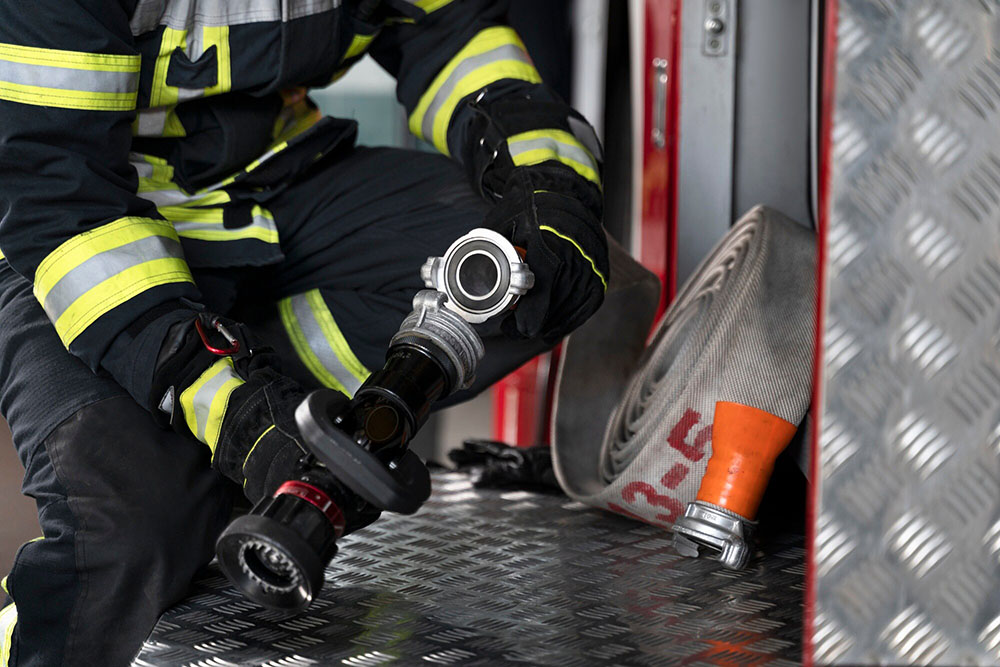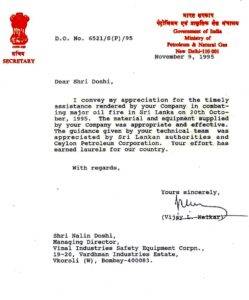Introduction
In the world of fire safety, reliability is not just a feature—it’s a necessity. Lives, assets, and entire businesses depend on the performance of fire safety equipment in critical moments. This is where certifications come into play. Certifications from respected global bodies like UL, FM, VdS, LPCB, CE, BIS, EIL, and MES provide a vital assurance of quality, reliability, and safety. In this blog, we will explore the significance of these certifications and how Vimal Fire Controls meets these stringent standards to ensure their products can be trusted when it matters most.
Understanding Fire Safety Certifications
Underwriters Laboratories (UL)
Significance: UL is a global safety certification company that sets rigorous standards for a wide range of products, including fire safety equipment. The UL mark is widely recognized and respected, symbolizing that a product has undergone thorough testing and evaluation to meet safety and performance standards.
Explanation: When a fire safety product is UL certified, it means the product has been tested for its ability to withstand and function effectively under the most demanding conditions. UL’s comprehensive testing procedures include checking the product’s durability, functionality, and performance consistency. For instance, a UL-certified fire extinguisher has been rigorously tested to ensure it can operate reliably in various fire scenarios, maintaining its effectiveness over time. This certification gives users confidence that the equipment will perform as expected when it is needed most.
Factory Mutual (FM)
Significance: FM Global, through its certification division FM Approvals, certifies products that meet high standards of property loss prevention. FM certification is particularly valued in the industrial sector, where the stakes are incredibly high.
Explanation: FM certification involves extensive testing to evaluate a product’s effectiveness in preventing property damage and loss. This certification is crucial for industries like oil and gas, chemical plants, and large manufacturing facilities, where fire risks can have catastrophic consequences. FM-certified fire safety equipment has been proven to withstand harsh conditions and maintain functionality, ensuring that industrial facilities are well-protected. This certification also provides assurance to insurance companies, which often require FM-certified equipment to reduce risks and potential losses.
Verband der Schadenversicherer (VdS)
Significance: VdS is a German institution that provides certification for fire safety and security products. VdS certification is known for its stringent testing protocols and high standards.
Explanation: Products carrying the VdS mark have been rigorously tested for reliability and performance under real-world conditions. This certification is essential for ensuring that fire safety equipment can function effectively in emergencies. VdS-certified products are trusted across Europe and globally, providing assurance that they meet high standards of safety and effectiveness. For example, VdS certification for a fire alarm system means the system has been tested for sensitivity, reliability, and durability, ensuring it can detect fires promptly and reliably.
Loss Prevention Certification Board (LPCB)
Significance: LPCB, part of the BRE Group, offers certification for fire safety and security products. LPCB certification involves rigorous testing and evaluation, ensuring that products meet international standards for performance and safety.
Explanation: LPCB certification is highly respected in the construction and insurance industries. Products that are LPCB certified have undergone thorough testing to prove their reliability in preventing and controlling fires. This certification is particularly important for large construction projects and buildings where fire safety is paramount. LPCB-certified products, such as fire doors and sprinkler systems, have been tested to ensure they can withstand intense fire conditions, providing crucial protection and minimizing fire damage.
Conformité Européenne (CE)
Significance: The CE mark indicates conformity with health, safety, and environmental protection standards for products sold within the European Economic Area (EEA).
Explanation: For fire safety equipment, the CE mark ensures that the product meets the essential requirements set out in European directives. This certification is vital for products intended for the European market, signaling compliance with rigorous safety standards. A CE-marked fire detection system, for example, has been evaluated for its design, functionality, and safety features, ensuring it meets the high standards required by European regulations. This certification helps maintain a high level of consumer protection and product safety across Europe.
Bureau of Indian Standards (BIS)
Significance: BIS is the national standards body of India, responsible for the certification of products to ensure they meet Indian standards for safety and quality.
Explanation: BIS certification for fire safety equipment is essential for products sold and used in India. It assures users that the equipment has been tested and approved according to national safety standards. This certification is crucial for ensuring that fire safety equipment, such as fire extinguishers and alarms, are reliable and effective in Indian environments. BIS certification involves comprehensive testing to verify the product’s durability, effectiveness, and compliance with Indian regulations, providing an added layer of trust for users.
Engineers India Limited (EIL)
Significance: EIL certification is particularly significant in the engineering and construction sectors in India.
Explanation: As a premier engineering consultancy and contracting company, EIL sets high standards for the equipment used in the projects it oversees. Certification from EIL indicates that fire safety equipment meets the stringent requirements necessary for large-scale industrial and infrastructure projects. EIL-certified products are tested for performance, reliability, and safety, ensuring they can withstand the demands of extensive and complex projects. This certification is crucial for ensuring that the equipment can provide effective fire protection in critical and large-scale applications.
Military Engineering Services (MES)
Significance: MES certification is crucial for products intended for use by the Indian military.
Explanation: This certification ensures that fire safety equipment meets the rigorous standards required for military applications. MES-certified products are trusted to perform reliably under extreme conditions, making this certification vital for equipment used in defense and other high-stakes environments. For instance, a fire suppression system with MES certification has been tested to ensure it can operate effectively in challenging and hazardous conditions, providing reliable protection for military assets and personnel.
The Role of Certifications in Ensuring Reliability
Testing and Quality Assurance
Explanation: Certifications involve comprehensive testing and quality assurance processes. Products undergo rigorous trials to evaluate their performance under various conditions, including extreme temperatures, high pressure, and prolonged use. This thorough testing ensures that the equipment can handle real-world scenarios effectively. For example, a certified fire suppression system has been tested to ensure it can quickly and effectively extinguish fires, even under challenging conditions, ensuring maximum protection.
Compliance with International Standards
Explanation: Certifications ensure that products comply with international standards for safety and performance. This is particularly important in a globalized market where products may be used in different countries with varying regulations. Certifications like UL, FM, and CE provide a common benchmark for quality, ensuring that certified products meet universally recognized standards. This compliance is crucial for maintaining consistency and reliability across different markets, ensuring that fire safety equipment performs effectively regardless of where it is used.
Building Trust and Credibility
Explanation: For manufacturers, obtaining certifications from respected bodies builds trust and credibility with customers. It signals a commitment to quality and safety, which is crucial in the fire safety industry. Customers, whether they are large industrial clients or individual consumers, can rely on certified products to provide the protection they need. For instance, a fire alarm system with LPCB certification gives building owners and occupants confidence that the system will function reliably in an emergency, providing timely alerts and enhancing safety.
How Vimal Fire Controls Meets These Standards
Continuous Improvement and Innovation
Explanation: Vimal Fire Controls continually invests in research and development to enhance the performance and reliability of its products. The company’s state-of-the-art R&D facility in Vadodara, Gujarat, is a testament to its commitment to innovation. By staying at the forefront of technological advancements, Vimal Fire Controls ensures its products not only meet current standards but also set new benchmarks in the industry. Continuous improvement efforts involve rigorous testing, feedback analysis, and incorporation of the latest technologies to ensure the highest levels of safety and efficiency.
Comprehensive Quality Management
Explanation: The company’s comprehensive quality management system is designed to ensure that every product meets the highest standards of safety and performance. This involves meticulous attention to detail at every stage of the manufacturing process, from design and development to production and testing. By maintaining strict quality control measures, Vimal Fire Controls ensures the reliability of its products. This includes regular audits, performance evaluations, and adherence to certification requirements to guarantee that each product performs as expected in real-world situations.
Conclusion
In the realm of fire safety, certifications are more than just marks of approval—they are vital assurances of quality, reliability, and performance. Certifications from UL, FM, VdS, LPCB, CE, BIS, EIL, and MES provide a crucial layer of trust, ensuring that fire safety equipment can be relied upon in critical moments. Vimal Fire Controls’ commitment to obtaining and maintaining these certifications underscores its dedication to providing the highest levels of safety and protection. By meeting these stringent standards, Vimal Fire Controls ensures that its products can be trusted to save lives and safeguard assets around the world.



